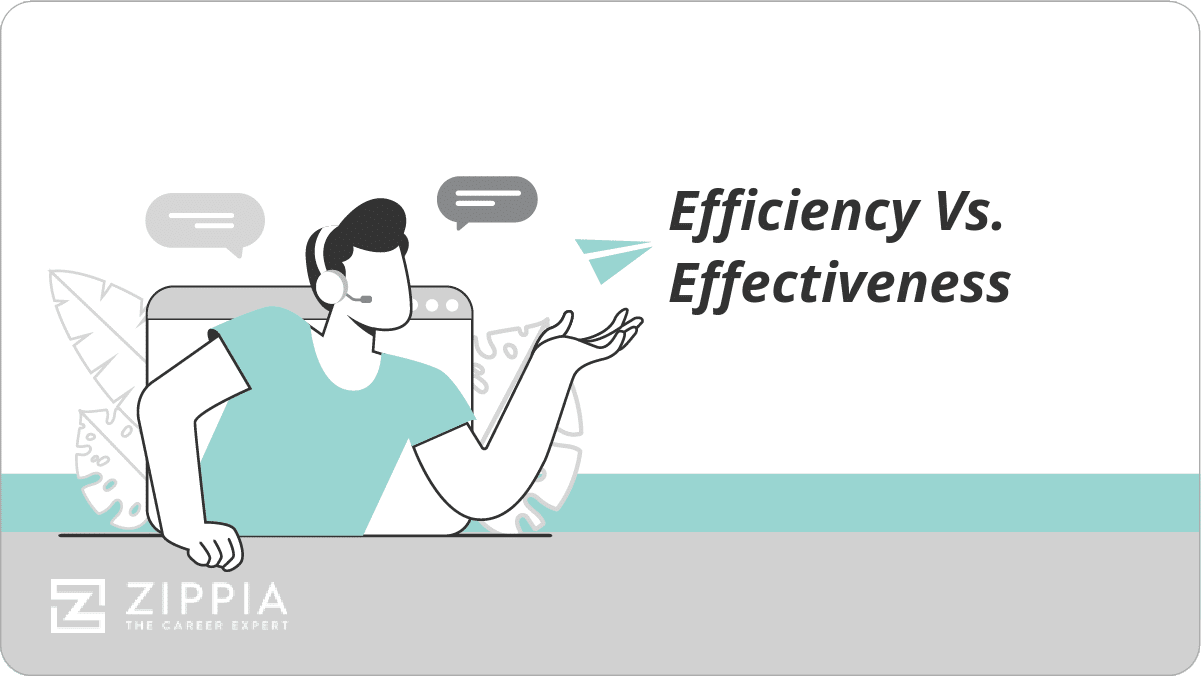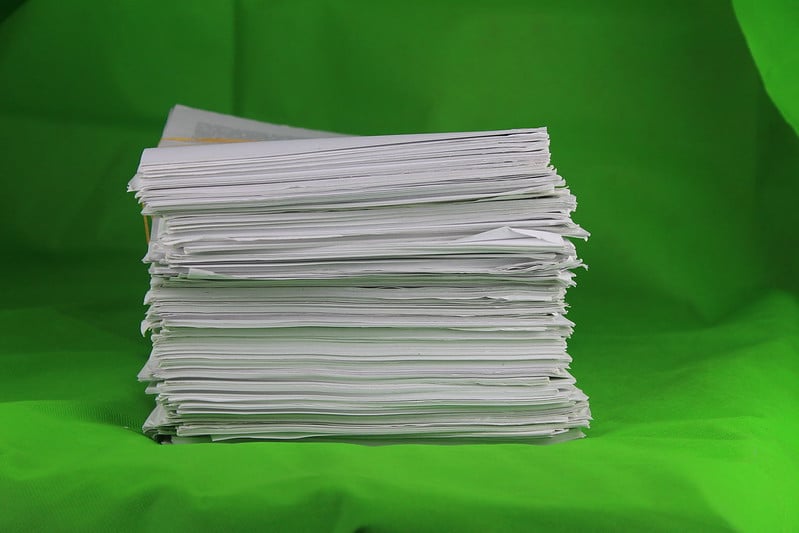- Glossary
- What Is Gross Monthly Income?
- What Is Management?
- What Is A Problem Statement?
- What Is Annual Net Income?
- What Is A Letter Of Transmittal?
- What Is Attrition?
- What Does White Collar Mean?
- What Does Blue Collar Mean?
- What Is Efficiency Vs Effectiveness?
- What Is A Dislocated Worker?
- What Is Human Resource (HR)?
- Thank You Letter Scholarships
- What Is Constructive Criticism?
- What Is A Quarter Life Crisis?
- What Is Imposter Syndrome?
- What Is Notes Payable?
- Types Of Communication
- Economic Demand
- Cost Benefit Analysis
- Collective Bargaining
- Key Performance Indicators
- What Is Gender Bias In A Job Description?
- What Is The Hidden Job Market?
- What Is The Difference Between A Job Vs. A Career?
- What Is A Prorated Salary?
- W9 Vs. 1099
- Double Declining Balance Method
- Divergent Vs Convergent Thinking
- Budgeting Process
- Types Of Intelligence
- What Is Bargaining Power?
- What Is Operating Capital?
- Difference Between Margin Vs Markup
- Participative Leadership
- Autocratic Leadership
- Authoratarian Leadership
- Situational Leadership
- Difference Between Generalist Vs Specialist
- Strategic Leadership
- Competitive Strategies
- Equity Vs Equality
- What Is Marginalization?
- Colleague Vs Coworker
- What Is The Glass Ceiling?
- What Are Guilty Pleasures?
- Emotion Wheel
- Nepotism In The Workplace
- Sustainable Competitive Advantage
- Organizational Development
- Communication Styles
- Contingent Workers
- Passive Vs Non Passive Income
- Choose A Career
- Formulas
- APR Formula
- Total Variable Cost Formula
- How to Calculate Probability
- How To Find A Percentile
- How To Calculate Weighted Average
- What Is The Sample Mean?
- Hot To Calculate Growth Rate
- Hot To Calculate Inflation Rate
- How To Calculate Marginal Utility
- How To Average Percentages
- Calculate Debt To Asset Ratio
- How To Calculate Percent Yield
- Fixed Cost Formula
- How To Calculate Interest
- How To Calculate Earnings Per Share
- How To Calculate Retained Earnings
- How To Calculate Adjusted Gross Income
- How To Calculate Consumer Price Index
- How To Calculate Cost Of Goods Sold
- How To Calculate Correlation
- How To Calculate Confidence Interval
- How To Calculate Consumer Surplus
- How To Calculate Debt To Income Ratio
- How To Calculate Depreciation
- How To Calculate Elasticity Of Demand
- How To Calculate Equity
- How To Calculate Full Time Equivalent
- How To Calculate Gross Profit Percentage
- How To Calculate Margin Of Error
- How To Calculate Opportunity Cost
- How To Calculate Operating Cash Flow
- How To Calculate Operating Income
- How To Calculate Odds
- How To Calculate Percent Change
- How To Calculate Z Score
- Cost Of Capital Formula
- How To Calculate Time And A Half
- Types Of Variables
Find a Job You Really Want In
- What Is the Difference Between Efficiency and Effectiveness?
- What Comes First, Effectiveness or Efficiency?
- What Does an Effective Leader Do?
- What Does an Efficient Leader Do?
- Evolving From Effectiveness to Efficiency
- Balancing Effectiveness and Efficiency
- Efficiency vs. Effectiveness FAQ
- Sign Up For More Advice and Jobs
Efficiency and effectiveness are often used interchangeably, but really they have two very different meanings and, as a result, two very different applications in the business world.
In this article, we discuss the differences between the two terms, the ways they can complement each other, and tips for how to grow in both efficiency and effectiveness.
Key Takeaways
-
In a nutshell, efficiency is how quickly a task gets done, and effectiveness is how well it’s done.
-
Companies, teams, and individual workers should strive to be both efficient and effective.
-
It’s best to start with effectiveness and then move toward efficiency.

What Is the Difference Between Efficiency and Effectiveness?
Efficiency is doing things the right way, while effectiveness is doing the right things. Something is effective if it produces the intended result, whereas it is efficient if it functions with the least use of resources. It is possible to be effective without being efficient and vice versa.
Consider these example scenarios for a better idea of the difference between efficiency and effectiveness.
-
Efficient. Alice develops a generic sales email she can send to 100 potential clients each day. 2% of her emails lead to a sale.
-
Effective. Bob researches potential clients and crafts a tailored email for each. He sends ten emails a day. 40% of his emails lead to a sale.
Alice has found a way to maximize her working hours, as far as customer contacts per hour go. She has the same resources as Bob (time, effort, list of leads, etc.) but achieves more connections. In other words, Alice has maximized her output, given the same input as Bob. She has streamlined the process of reaching a large number of clients quickly.
Bob, on the other hand, has a strategy for closing sales more regularly. He spends more time and resources on each email, but that effort pays off with a higher success rate. Bob has prioritized developing meaningful connections over contacting a maximum number of clients in the shortest time frame. He has focused on the goal of selling the company’s products rather than performing that function quickly.
Here’s a quick breakdown of the differences between efficiency and effectiveness:
-
Efficiency
-
Process-oriented (best possible methods with least wasted resources)
-
Improves current workflow (present-oriented)
-
Measurable using predefined metrics
-
Time-sensitive
-
Input/output ratio matters
-
Primarily concerned with internal mechanisms (using minimal company resources for maximum payoff)
-
-
Effectiveness
-
Goal-oriented (best possible result, regardless of resources used)
-
Improves quality of work (future-oriented)
-
Difficult to measure
-
Not time sensitive
-
Input/output ratio is unimportant
-
Primarily concerned with external results (competitive position in the market)
-
While efficiency and effectiveness focus on different aspects of a well-functioning business, they are not mutually exclusive. Let’s expand our hypothetical scenarios from earlier to include more people.
-
Inefficient and ineffective. Connor crafts a generic sales email and sends it to twenty potential clients a day. 1% of his emails lead to a sale.
-
Efficient and effective. Denise develops a partially generic sales email, then incorporates client research to make each email somewhat personally tailored. She sends it to twenty potential clients a day. 30% of her emails lead to a sale.
As you can tell, every business wants an employee like Denise. She has developed a more efficient system than Bob’s while only sacrificing a bit of effectiveness.
Connor is the ultimate drag on business. His tactics are ineffective in leading to sales, and he employs those tactics inefficiently.
For those keeping track at home: Alice (ineffective, efficient) makes two sales per day, Bob (effective, inefficient) makes four, Connor (ineffective, inefficient) makes 0.2, and Denise (effective, efficient) makes six.
What Comes First, Effectiveness or Efficiency?
Effectiveness should be the first priority of any business, followed by developing efficient practices. Think of it this way: if it’s your first time baking an apple pie, are you more concerned with crafting a delicious dessert or baking it in record time and with the fewest apples? Clearly, delivering a tasty treat is more important than baking it efficiently.
In the same vein, businesses should strive only to perform tasks that effectively promote profits and growth. It doesn’t matter if a company can develop a project with few resources in a short space of time if that project doesn’t align with corporate goals.
The biggest issue with prioritizing efficiency over effectiveness is that people may never actually perform their tasks because they become stuck trying to optimize how they complete them. It is essential first to learn how to perform a task, even if your methods are not optimal. Then, you can iterate and improve, making the completion of your effective task more efficient.
The first step in making a productive company is focusing on effectiveness, even at the cost of efficiency. Once a business puts effective practices in place, the company can begin making those practices more efficient.
What Does an Effective Leader Do?
An effective leader looks outside the bounds of his or her company to the bigger picture. He or she sets expectations that individuals can easily align with their work practices. It takes discipline and long-term thinking to be an effective leader. Following these tips can make your leadership more effective:
-
Do the right things. Sounds simple, we know, but doing the right things poorly is more important than doing the wrong things well. Effective leaders manage their workers, so they spend time only on work that aligns with broader corporate goals.
-
Seek feedback. Effective leaders are aware of their blind spots. They value contributions from employees who have ideas on developing more effective methods and inspire others to create ideas that can aid the company.
-
Hire and develop the right people. You can have the best strategies in the world, but if you don’t have the human capital to make it happen, you’ve got next to nothing. Effective leaders invest in recruitment strategies that attract top talent.
They also develop the strengths of existing employees and internally promote those that best contribute to the company’s effectiveness.
-
Synergize. Corporate goals are all fine and well, but they take several departments and countless individuals to actualize. Effective leaders know how to encourage collaboration and communication so that all workers understand what their broader goals are and where they fit into those goals.
-
Manage time. Time is a company’s most valuable resource. Effective leaders maximize their time by focusing on long-term strategies and determining corporate goals. They don’t get bogged down in the minutiae of day-to-day tasks, instead seeking to optimize the value of those tasks.
-
Make decisions. Effective leaders make big picture decisions using the input of those around them. They also take both the internal (available resources) and external (market trends) elements into account before reaching a decision.
What Does an Efficient Leader Do?
Efficient leaders are good at making the resources they have stretch as far as possible. It takes creativity and discipline to be efficient, especially when combined with effectiveness. Here are some of the things you can do to become a more efficient leader:
-
Improve processes. Whether it’s how you complete your own work or how your department operates, keep your eyes open for how you can streamline processes and workflows. This can be one of the best ways to become more efficient and effective at the same time.
-
Stay focused on the task at hand. While it’s important for leaders to be able to look at the big picture, they also need to be able to focus on what they need to do right this minute.
These small tasks are what keep departments moving, so it’s important that you’re able to complete them without getting distracted.
-
Follow a routine. No, you don’t need to be strict about your routine, but finding a methodical way to do something is the best way to help you do it quickly and accurately over and over again.
This could be used for how you structure your day, organize your meetings, or tackle your work tasks.
-
Find the right tools. Whenever it’s possible and practical, take the time to find a tool for your team that can remove some busy work or streamlines a process. Whether it’s software or a filing system, having the right tools will go a long way toward improving efficiency.
-
Support your team. Your employees won’t be able to move quickly if you’re holding them back. Prioritize signing forms and responding to questions quickly so that they can keep working efficiently — and so that you’re leading by example as far as efficiency goes.
-
Communicate. Nothing will happen efficiently if people are confused by what you want from them. Overcommunicate if necessary and then ask for feedback to make sure that your message came across clearly.
You might be surprised by how many times something you thought you communicated perfectly got lost in translation.
Evolving From Effectiveness to Efficiency
Once a company puts effective methods into place, evolving its efficiency is the next step. If a company has a top-quality product but struggles to deliver it to clients efficiently, they will struggle to compete in the market. That’s the macro view of things. On an individual level, we can break down the evolution to efficiency into five steps:
-
Practice the most effective ways of performing your task, regardless of the time and resources spent.
-
Learn more about the process through trial and error.
-
Look for actions that can be automated, done with fewer resources, completed faster, or cut out entirely.
-
Analyze the results of these changes and see how much effectiveness you lose by optimizing efficiency.
-
Repeat the process and continue to adjust.
Companies that establish effective practices but don’t look for a better way to perform them succumb to inefficiency. The key is to develop key performance indicators so that any structural changes made to improve efficiency can be adequately measured and altered if need be.
Balancing Effectiveness and Efficiency
As you can probably tell by now, balancing effectiveness and efficiency is the Holy Grail for any business. If efficiency is doing things the right way and effectiveness is doing the right things, then a good balance of the two means doing the right things the right way.
That means starting with a solution, however imperfect, to a problem. Then, implement that solution and learn from it. Finally, use your experiences to determine the best ways to improve upon that solution to increase efficiency.
Ultimately, clients want an effective product. But if a company can’t keep up with the demand, their market share will fall off. Every situation is different. A company that’s trying to grow aggressively and has ample resources might prioritize effectiveness. But a company that’s content with their market share and has limited resources will prioritize making their operations more efficient.
Finding the balance between effectiveness and efficiency is the ultimate goal, whether on a personal or corporate level. Work to find the most effective methods and then adjust those to maximize efficiency, and you’ve positioned yourself to be productive and successful.
Efficiency vs. Effectiveness FAQ
-
What is the difference between efficiency and effectiveness, with examples? The difference between efficiency and effectiveness is that effectiveness refers to performing actions that will help achieve some goal, while efficiency refers to performing those actions with the least amount of time or resources expended.
Examples of the difference between efficiency and effectiveness are all around us. Consider cars and trains. Both are highly effective for transporting people long distances. But trains are able to transport more people using fewer resources (gasoline, fewer railroads than roads, etc.) than cars, making trains much more efficient.
-
What is effectiveness and efficiency in management? In management, effectiveness refers to your team or company’s ability to accomplish results that you’ve identified as essential for the business’s success.
In order to measure the effectiveness of a project, task, or process, you need to first have some way of measuring whether or not you’ve achieved what you set out to achieve. In a sense, this makes effectiveness a subjective measure. The same task can become less effective as goals and conditions change.
As a manager, efficiency refers to your team’s ability to produce successful results with less time and fewer resources. For example, you may measure your project’s effectiveness by how many new customers it generated, while you’d measure its efficiency by how much it cost, how many employees spent time on it, and how much time they spent on it.
-
What is an example of efficiency? Fuel efficiency is a common example of efficiency we think about all the time. The term “miles per gallon” is a measure of efficiency. It’s answering the question “how many miles can this vehicle go on one gallon gasoline,” which makes it a useful comparative measure when shopping for cars.
A more fuel efficient car takes you farther with fewer resources (and ultimately less money).
-
Can you be efficient without being effective? If something is not at all effective, then it cannot be made efficient.
Remember that “effective” is essentially a subjective term. In other words, even when you don’t say it, you’re implying that a task is effective at something in particular. For example, rubbing rocks together is really effective at making noise, but it takes a special kind of rock to be effective at making sparks as well.
No amount of reduced resources or time will increase your spark-generating efficiency if you’re using the wrong rocks, because your task will literally never produce the desired result.
-
Why is efficiency important? From energy efficiency to efficiency at work, most of us value a job done without any wasted time or resources. Working efficiently ensures that you’re working smarter, not harder.
- Glossary
- What Is Gross Monthly Income?
- What Is Management?
- What Is A Problem Statement?
- What Is Annual Net Income?
- What Is A Letter Of Transmittal?
- What Is Attrition?
- What Does White Collar Mean?
- What Does Blue Collar Mean?
- What Is Efficiency Vs Effectiveness?
- What Is A Dislocated Worker?
- What Is Human Resource (HR)?
- Thank You Letter Scholarships
- What Is Constructive Criticism?
- What Is A Quarter Life Crisis?
- What Is Imposter Syndrome?
- What Is Notes Payable?
- Types Of Communication
- Economic Demand
- Cost Benefit Analysis
- Collective Bargaining
- Key Performance Indicators
- What Is Gender Bias In A Job Description?
- What Is The Hidden Job Market?
- What Is The Difference Between A Job Vs. A Career?
- What Is A Prorated Salary?
- W9 Vs. 1099
- Double Declining Balance Method
- Divergent Vs Convergent Thinking
- Budgeting Process
- Types Of Intelligence
- What Is Bargaining Power?
- What Is Operating Capital?
- Difference Between Margin Vs Markup
- Participative Leadership
- Autocratic Leadership
- Authoratarian Leadership
- Situational Leadership
- Difference Between Generalist Vs Specialist
- Strategic Leadership
- Competitive Strategies
- Equity Vs Equality
- What Is Marginalization?
- Colleague Vs Coworker
- What Is The Glass Ceiling?
- What Are Guilty Pleasures?
- Emotion Wheel
- Nepotism In The Workplace
- Sustainable Competitive Advantage
- Organizational Development
- Communication Styles
- Contingent Workers
- Passive Vs Non Passive Income
- Choose A Career
- Formulas
- APR Formula
- Total Variable Cost Formula
- How to Calculate Probability
- How To Find A Percentile
- How To Calculate Weighted Average
- What Is The Sample Mean?
- Hot To Calculate Growth Rate
- Hot To Calculate Inflation Rate
- How To Calculate Marginal Utility
- How To Average Percentages
- Calculate Debt To Asset Ratio
- How To Calculate Percent Yield
- Fixed Cost Formula
- How To Calculate Interest
- How To Calculate Earnings Per Share
- How To Calculate Retained Earnings
- How To Calculate Adjusted Gross Income
- How To Calculate Consumer Price Index
- How To Calculate Cost Of Goods Sold
- How To Calculate Correlation
- How To Calculate Confidence Interval
- How To Calculate Consumer Surplus
- How To Calculate Debt To Income Ratio
- How To Calculate Depreciation
- How To Calculate Elasticity Of Demand
- How To Calculate Equity
- How To Calculate Full Time Equivalent
- How To Calculate Gross Profit Percentage
- How To Calculate Margin Of Error
- How To Calculate Opportunity Cost
- How To Calculate Operating Cash Flow
- How To Calculate Operating Income
- How To Calculate Odds
- How To Calculate Percent Change
- How To Calculate Z Score
- Cost Of Capital Formula
- How To Calculate Time And A Half
- Types Of Variables





